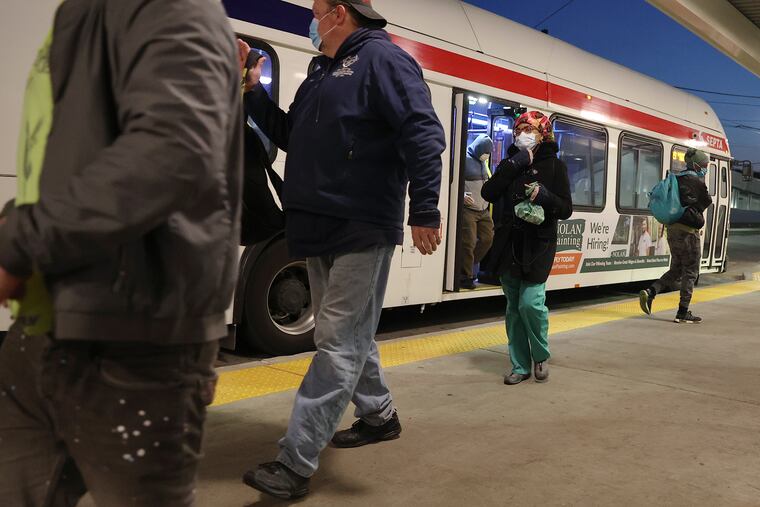SEPTA should extend benefits to families of workers who died from COVID-19 | Opinion
SEPTA needs to put its money where its mouth is and show its employees how much they value the extreme risks workers are taking to keep our city running.

The COVID-19 pandemic has revealed the important role workers of all kinds play to make our society function. Essential workers have put themselves and their families at great personal risk delivering our packages, stocking grocery shelves, tending to the sick, and much more. Public transit workers are especially important, as they help get essential workers to and from their jobs, and help those without cars complete necessary errands. Nationally, this group of workers is also among the most likely to become infected with the deadly virus.
In Philadelphia, over 200 SEPTA employees and Transport Workers Union (TWU) Local 234 members have tested positive for the virus. Tragically, seven have died. The union is demanding that SEPTA provide death benefits for the families of workers who have died from COVID-related illnesses. SEPTA needs to accept this demand as just recognition of their workers putting their lives on the line to serve the public.
Because of how slow SEPTA was to act on keeping workers safe at the start of the COVID-19 pandemic, TWU threatened a potential work stoppage just to get basic safety measures put in place. While SEPTA claimed the changes it eventually made were not in response to union demands, the agency only added these measures after TWU pushed. The measures, such as backdoor boarding and no onboard fare collection, improved safety for not only employees but passengers, too. SEPTA has also required riders to wear masks as of Monday, implemented some in-house testing procedures, and proposed a more thorough cleaning schedule. However, these measures came too late — and after many workers were already infected.
Kelly Cofrancisco, a spokesperson for Mayor Jim Kenney, said: “Health-care workers and other essential staff are relying on SEPTA more than ever, and it’s critical that we work together to ensure public transportation is accessible to those who need it.” This was part of their office’s pushback against TWU’s threatened job action, when Cofrancisco echoed Kenney’s belief that it “would jeopardize many lives.”
Words of support for transit workers ring hollow if they are not backed up with the money these workers and their families deserve. What employees are asking for should not be seen as a privilege or fringe benefit. It’s the least employers can do to show their respect and gratitude.
Fortunately, the New York City Metropolitan Transit Authority has shown that it’s possible to give some compensation to the family members of lost MTA employees for the pain and instability they have been put through. Families of MTA workers who died from the coronavirus will receive twice the usual amount of line-of-duty death benefits. The funds will come from the MTA operating revenues and additional funds they received from the federal stimulus. At SEPTA, however, families of employees who have died from COVID-related illness don’t even receive standard death benefits.
» READ MORE: Fare breaks are great, but SEPTA’s funding future still cloudy | Editorial
SEPTA received $643 million in federal coronavirus aid. While thanking essential workers is welcome, putting a portion of this aid money toward death benefits for the families of fallen SEPTA employees shows real appreciation. They are now taking on risks far beyond what they originally envisioned. As President John Costa of the Amalgamated Transit Union said: “We didn’t sign up to die on these jobs.” While Philadelphia enters the yellow phase and quarantine restrictions are relaxed, the danger for SEPTA employees is far from over, and may even increase in the coming months.
SEPTA’s general manager, Leslie Richards, can safely work from home, a luxury obviously not afforded to those who operate our city’s busses, subways, trolleys, and trains. Richards takes home a salary of $330,000 per year, much more than the average SEPTA employee. Yet she has remained silent on the proposal for a one-time payment of $500,000 to the families of employees who die from COVID-related illnesses.
When Richards confirmed the deaths of two SEPTA employees at the beginning of May, she stated: “Together, we will help each other through this.” But how will the families of SEPTA workers get through the death of their loved ones without financial support? SEPTA needs to put its money where its mouth is and show its employees how much they value the extreme risks workers are taking to keep our city running.
Paul Prescod is a member of the Philadelphia Federation of Teachers and co-chair of the Philly DSA Labor Commission.